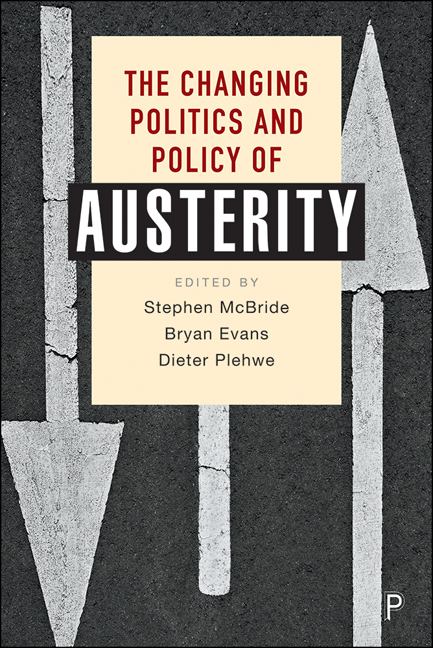Book contents
- Frontmatter
- Contents
- List of figures and tables
- Notes on contributors
- Acknowledgements
- Introduction
- PART I Austerity and the promotion of the private
- PART II Coping and casualties: labour and the social
- PART III Beyond coping: protest, pathologies and the development of real alternatives
- Conclusion
- Index
13 - Austerity after COVID-19: from emergency pragmatism to inclusive economic governance in Europe
Published online by Cambridge University Press: 13 May 2022
- Frontmatter
- Contents
- List of figures and tables
- Notes on contributors
- Acknowledgements
- Introduction
- PART I Austerity and the promotion of the private
- PART II Coping and casualties: labour and the social
- PART III Beyond coping: protest, pathologies and the development of real alternatives
- Conclusion
- Index
Summary
Following the outbreak of COVID-19 in early 2020, the European Union is still in the midst of one of the biggest economic crises after World War II. While it is still too early to get a full picture of the economic impact of the lockdowns imposed in order to stop the spread of the virus, the immediate consequences are already quite severe. For 2020, the European Union expects its economy to shrink by 6.4 per cent (Eurostat 2021a). The EU-27 unemployment rate rose from 6.5 per cent in February 2020 before the crisis to 7.5 per cent in December 2020 (Eurostat 2021b). The most important reason why Europe has not seen an even more dramatic increase – especially when compared to the United States with a peak of over 40 million unemployed – is the widespread support of workers through short-time work programmes. At the end of April, businesses in the European Union had submitted roughly 42 million applications to support workers through short-time work programmes. That is equivalent to nearly 27 per cent of all EU employees (Müller and Schulten 2020a). Lockdowns and business closures have hit workers and welfare recipients especially hard, and they are the ones who will have the toughest time finding new jobs or compensating for lost income.
The immediate policy responses of many European countries have focused on a combination of bailout packages for businesses and different social policy measures to support workers and in some cases welfare recipients. In addition, the EU member states have agreed to set up a recovery fund of €750 billion, allowing the EU commission to take on a large amount of shared debt on financial markets and distributing half of the money via non-repayable grants and the other half in the form of loans. In the immediate aftermath of the COVID-19 crisis, most governments had to act as a ‘lender of last resort’ and drastically increased their short-term public spending. Consequently, according to the European Commission's Spring 2020 Economic Forecast, the euro area budget deficit is expected to increase to 8.5 per cent of GDP in 2020 from 0.6 per cent of GDP last year.
- Type
- Chapter
- Information
- The Changing Politics and Policy of Austerity , pp. 272 - 291Publisher: Bristol University PressPrint publication year: 2021



